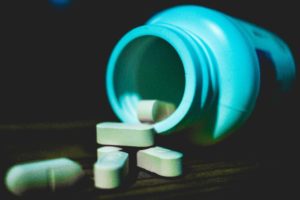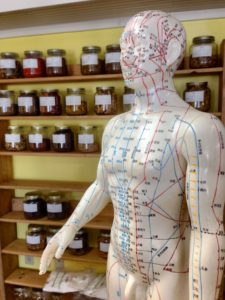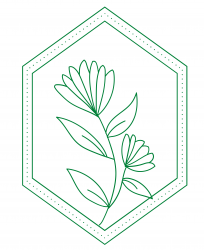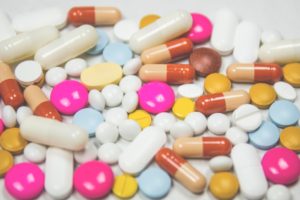by Sara M Allen, AP, Dipl. OM
Why is a newly-released study on side effects so important?
How many prescription drugs does the average person take? According to a 2013 study by the Mayo Clinic, 70% of Americans take at least one prescription drug, 50% take at least two, and 20% take FIVE or more medications. Each of these have a list of side effects. The latest June 2018 Journal of the American Medical Association (JAMA) studied the side effect of depression caused by taking medications.
When a new prescription medication is filled at the pharmacy, a long list of possible side effects accompanies the drug. How many people read the list? Pay attention once taking the medicine? Or have had a doctor follow up with questions about side effects? And sometimes, because the medication is “necessary,” negative side effects are countered by another medication with another list of side effects, which causes side effects that must be countered by another medication, and the wheel keeps spinning.

Every medicine has side effects, and it is unknown how taking multiple medications will potentiate or compound those side effects. In this study on the side effect of depression in JAMA, of the 6.9% of those in the study taking 3 or more medications that have a possible “depression” side effect, 15% of those actually had depression, versus 4.7% which were not on medications with the side effect of depression. This study showed that taking multiple medications with the same possible side effect increases the likelihood of that side effect. (It should be noted that this study excluded people taking anti-depressants for pre-existing depression).
What does the study mean for you and your medications?
- Make sure your doctor knows all of your medications and supplements. Make a list of medications before appointments along with dosages. If there are any known drug interactions, it is more likely they will be prevented if your doctor and pharmacist know what you’re taking. Ultimately, you and your doctor are a team to determine which medications you need to be on and whether any of those medications can be reduced or eliminated.
 Be educated about your medications. Read the packaging that comes with your prescriptions. Watch out for symptoms and side effects. Sometimes these effects are cumulative and may take a while for your body to express. And sometimes, as this study shows, less-likely side effects may be more likely when combined with other medications.
Be educated about your medications. Read the packaging that comes with your prescriptions. Watch out for symptoms and side effects. Sometimes these effects are cumulative and may take a while for your body to express. And sometimes, as this study shows, less-likely side effects may be more likely when combined with other medications.- More is not better. Not only are prescription medications expensive and drive up health insurance costs for everyone, but they have powerful, unknown effects on the body. Modern medicine is a very young medicine, less than 200 years old, and the long-term and drug-interaction effects of pharmaceuticals are too new to fully know. There are few studies like the one in this month’s JAMA which show how drugs may interact with each other. The FDA doesn’t require it, and it would be impossible to study how thousands and thousands of drugs interact when taking 3, 4… or even 9 different combinations of them. Therefore, limit your exposure to these interactions and side effects by limiting your medications whenever possible, and discuss your options with your doctor.
- Check out alternative medical solutions. The U.S. Pharmaceutical Industry makes over 440 billion dollars a year. Drug companies and pharmacies make money on prescriptions. Many of these medications just alleviate symptoms of a disease but do not help the body heal. Be willing to check out other options for wellness, which can lessen one’s dependence on drugs. These might include:
 Diet and lifestyle changes. Let’s be honest. Change is difficult and sometimes inconvenient, but changes can bring health from the inside out. These choices are long-term, life-giving options that do not come with negative or dangerous side effects. For example, diabetic or blood-pressure medications may be reduced by losing weight and exercising.
Diet and lifestyle changes. Let’s be honest. Change is difficult and sometimes inconvenient, but changes can bring health from the inside out. These choices are long-term, life-giving options that do not come with negative or dangerous side effects. For example, diabetic or blood-pressure medications may be reduced by losing weight and exercising.- Alternative therapies. Acupuncture and Chinese Medicine, chiropractic care, and physical therapy are a few alternative therapies that may help with whatever condition you are treating with pharmaceuticals. The goal of these alternative or integrative medical therapies is to help the body heal or treat the underlying cause of the disease or problem. Because these therapies are a process of healing in the body, symptom relief may not be as immediate as popping a pill, but with a little patience and determination the body can heal itself.
- Herbal formulas, natural supplements, and essential oils. Many modern pharmaceuticals began as plant-based remedies. Almost every civilization on earth has had its special plants for certain diseases. The chemical properties of these remedies have been isolated and improved upon to target a disease or symptom. But what if the lesser-concentrated, holistic plant-package is actually less harmful to the body than its lab-concocted cousin?

- Chinese herbal formulas have been safely used for thousands of years, and the herbs in these formulas are balanced with each other to minimize the side effects. Only an Oriental Medicine or Chinese herbal practitioner can safely prescribe herbs perfectly tailored to your body and symptoms.
- Also, supplements can be taken to help the body function properly. Many supplements can take the place of over-the-counter or prescribed medications. Check with your healthcare practitioner to find out which ones might be right for you (and remember, as with prescription drugs, more is not necessarily better!).
- One of my new favorites, which is actually very ancient, is the use of essential oils to treat certain conditions. When used as directed, essential oils are an excellent alternative to certain prescription or over-the-counter drugs (more to come on essential oils–stay tuned).
Many other side effects can be treated effectively with acupuncture. There are points on the body that help certain problems and symptoms and treat the body’s underlying condition. Whether a medication is causing depression, dizziness or diarrhea, acupuncture can help lessen the side effects of medications. No one should be stuck on the hamster wheel of taking more and more medications to combat the side effects of medications.
(If you are feeling depressed, please speak to a healthcare practitioner, counselor or mental health provider. And if you are considering suicide or hurting yourself or others—please reach out to someone and get some help, or call the National Suicide Prevention Lifeline at 1-800-273-8255.)
Hope that’s some helpful information to help you have Better Health for a Better You!
Please feel free to call for your free consultation: 561-922-7535 or fill out this contact form:


